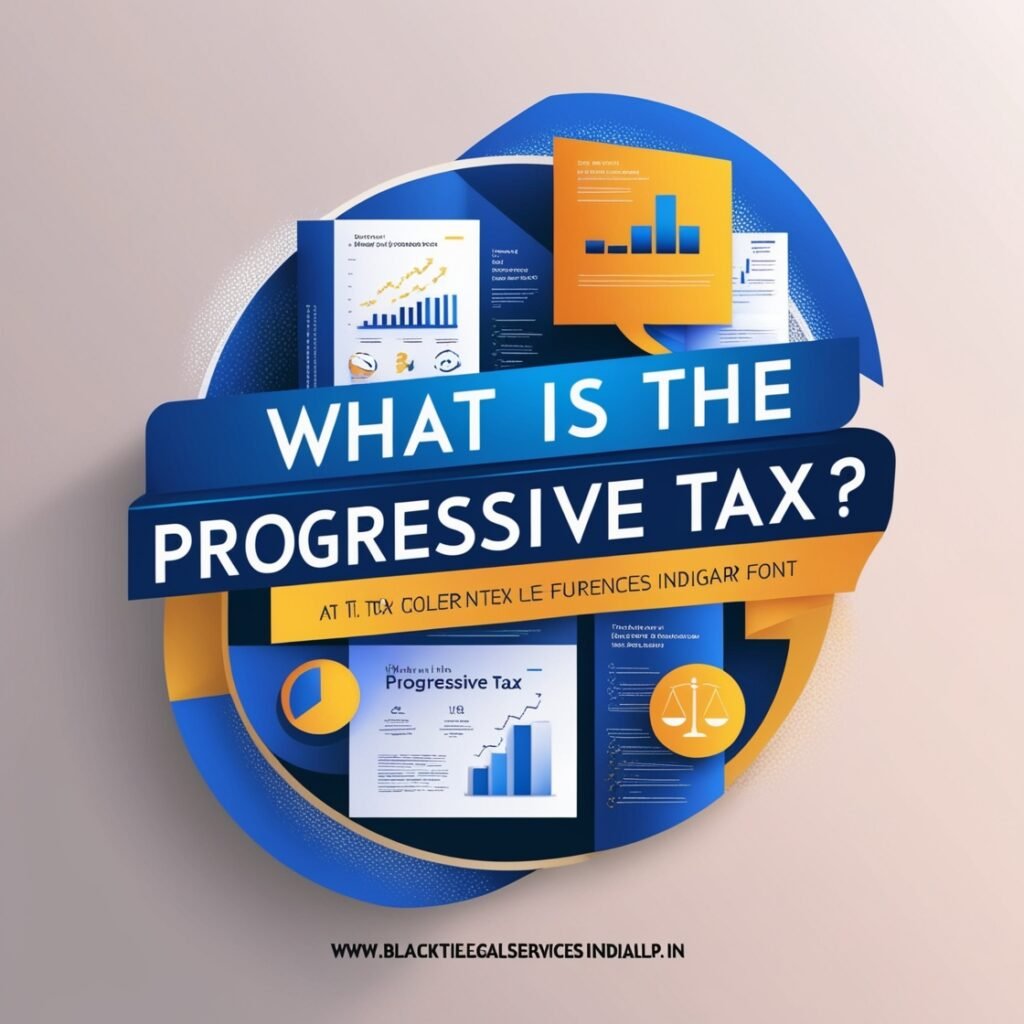In this blog, we explore the top 7 types of progressive taxes in India, highlighting their meaning and consequences on individuals and businesses. Progressive taxes are the cornerstone of India’s taxation system, designed to ensure justice by levying higher tax rates on those with greater financial ability. These taxes not only generate income for the government but more importantly, also play an important role in reducing income inequality and promoting social homogeneity.
- What is the Progressive Tax?
- What are the Top 7 Types Of Progressive Taxes in India?
- 1. Income Tax
- 2. Corporate Tax (Partially Progressive)
- 3. Wealth Tax (Abolished in 2015, Previously Progressive)
- 4. Luxury Tax (Now GST-Linked)
- 5. Estate or Inheritance Tax (Proposed, Not Currently in Use)
- 6. Securities Transaction Tax (STT, Indirectly Progressive)
- 7. Capital Gains Tax
- Conclusion
- FAQs
- Q1. What is an example of a progressive tax?
- Q2. What is the difference between progressive and regressive?
- Q3. Is inflation a regressive tax?
- Q4. What is the definition of progressive tax?
- Q5. Does India have progressive taxes?
- Q6. Is GST a progressive tax?
- Q7. Is indirect tax progressive?
- Q8. What is a synonym for progressive tax?
What is the Progressive Tax?
Progressive tax is a taxation system where the tax rate increases as the taxable amount (such as income) increases. This means that individuals or entities with greater income or wealth pay a greater percentage of their income or wealth in taxes than those with lower incomes. The main goal of progressive taxation is to reduce income inequality by placing a greater tax burden on those who can afford it while providing relief to lower-income individuals.
1. Income-based tax rates: Tax rates increase with higher income groups.
2. Equity in taxation: Fairness is ensured by levying a higher percentage of tax on higher-income earners.
3. Reduces inequality: Redistributes wealth to fund public services and welfare programs.
4. Marginal tax rates: Tax is calculated based on income within specific categories.

What are the Top 7 Types Of Progressive Taxes in India?
1. Income Tax
2. Corporate Tax (Partially Progressive)
3. Wealth Tax (Abolished in 2015, Previously Progressive)
4. Luxury Tax (Now GST-Linked)
5. Estate or Inheritance Tax (Proposed, Not Currently in Use)
6. Securities Transaction Tax (STT, Indirectly Progressive)
7. Capital Gains Tax
To File all Types Of Taxes Contact Our Expert Team
1. Income Tax
Income tax is a direct tax levied by the Indian government on the income earned by an individual or an entity during a financial year. The tax collected is used to fund public services, infrastructure, and welfare schemes.
1. Progressive tax system: Tax rates increase with higher income groups, ensuring fairness.
2. Taxable Entities:
Individuals
Hindu Undivided Family (HUF)
Firms and Companies
Body of Individuals (BOI) and Association of Persons (AOP)
Artificial Judicial Person
3. Tax Slabs: Different tax rates are applicable depending on the income group and taxpayer category.
2. Corporate Tax (Partially Progressive)
Corporate tax in India is partially progressive, meaning that it provides different tax treatments to companies based on unusual criteria such as turnover or the type of corporation. While all companies are subject to corporate tax, smaller companies and special entities enjoy lower tax rates than larger corporations, making it partially in line with the principles of progressive taxation.
Unlike a fully progressive system, where tax rates rise with rising profits, India’s corporate tax uses turnover as a proxy, making it only marginally progressive. A fully progressive corporate tax would require tax rates to increase based on the actual profit margins of companies.

3. Wealth Tax (Abolished in 2015, Previously Progressive)
Wealth tax was a direct tax levied on the immovable wealth of individuals, Hindu Undivided Families (HUFs), and companies in India. It was abolished in the Union Budget 2015-16, effective April 1, 2016, and replaced by a surcharge on the super-rich. Here’s an overview of what it involved.
1. Progressive Nature:
It was levied at a flat rate of 1% on net wealth exceeding Rs 30 lakh.
This made it progressive as only high-net-worth individuals and entities with significant assets were subject to it.
2. Tax Base: Net worth is calculated by deducting debts paid on taxable assets from the total value of taxable assets.
3. Applicability:
Individuals.
Hindu Undivided Families (HUF).
Companies.
4. Extent of taxation: Tax was imposed on property worth more than Rs.30 lakhs, making it the target for the affluent sections of society.
4. Luxury Tax (Now GST-Linked)
Under the Goods and Services Tax (GST), luxury goods and services for wealthy consumers are taxed at higher rates. The luxury tax, which was previously levied on items such as expensive cars and stays in costly hotels, has now been subsumed into the GST framework.
1. Higher GST rates: Luxury goods are taxed at 28%, while additional cess is levied on items like cars (up to 22%) and tobacco.
2. Luxury services: Rates are higher for services such as premium hotel stays (above Rs 7,500 per night) and business class flights.
5. Estate or Inheritance Tax (Proposed, Not Currently in Use)
Estate or inheritance tax is a tax that is levied on the transfer of a person’s property after his death. In India, although there was once a wealth tax system that applied to individuals based on their net worth, the estate tax (also called inheritance tax) was abolished in 1985. However, there have been discussions from time to time about reintroducing it, although it has not been reintroduced.
Progressive structure: Higher-value estates were taxed at higher rates.
Exemption limit: Small estates were either exempted or taxed at a lower rate.
Reasons for abolition: Difficult to enforce, reduced savings, and burden on heirs.

6. Securities Transaction Tax (STT, Indirectly Progressive)
Securities transaction tax (STT) is a tax levied on the purchase or sale of securities listed on a recognized stock exchange in India. Although it is not explicitly progressive, it can be considered “indirectly progressive” because the tax burden increases with larger transaction volumes or high-value transactions, indirectly affecting wealthy investors.
1. Simplicity: Calculating STT is simple as it is based on the transaction value.
2. No complicated filing: Since the tax is paid directly at the time of the transaction, there is no need for traders to file separate returns for STT.
3. Encourages long-term investments: By imposing lower STT on delivery-based transactions (for long-term investments), it encourages investors to retain their securities, thereby promoting market stability.
7. Capital Gains Tax
Capital gains tax is a tax levied on the profit earned from the sale of a capital asset, such as real estate, stocks, bonds, or other investment assets. In India, this tax is classified into short-term capital gains (STCG) and long-term capital gains (LTCG) based on the holding period of the asset before it is sold.
1. Capital assets: Capital assets refer to any asset held by an individual or entity, whether or not linked to work or profession. It includes natural assets (such as land or buildings) and financial assets (such as shares, bonds, etc.).
2. Capital Gains: The profit earned from the sale of a capital asset is the difference between the sale price and the purchase price (after adjusting any associated costs like brokerage, registration fees etc.).
Conclusion
Progressive taxes play an important role in promoting economic equality and social justice by implicitly implying that individuals with higher incomes or wealth contribute a larger share of taxes. This system conforms to the “ability to pay” principle, reduces income inequality, and generates revenue for essential public services such as education, healthcare, and infrastructure.
Since progressive taxation supports fairness and redistributive policies, it must balance equity with efficiency to avoid discouraging investment and wealth growth. A well-structured progressive tax system, combined with the effective management and transparent use of tax revenues, can promote a more inclusive and sustainable society.
FAQs
Q1. What is an example of a progressive tax?
An example of a progressive tax is income tax. In India, high-income-earning individuals are taxed at higher rates ranging from 5% to 30% depending on their income range, ensuring that people with greater financial resources contribute more.
Q2. What is the difference between progressive and regressive?
Progressive taxes: People with higher incomes pay a higher tax rate, which reduces income inequality.
Regressive taxes: People with lower incomes bear a higher tax burden, which increases inequality.
Q3. Is inflation a regressive tax?
Inflation can act as a regressive tax because it disproportionately affects lower-income individuals. As prices rise, essential goods and services become more expensive, causing poor families to spend a larger share of their income than wealthier ones.
Q4. What is the definition of progressive tax?
A progressive tax is a taxation system in which the tax rate increases as a taxpayer’s income or wealth increases, ensuring that individuals or entities with higher incomes pay a larger percentage of their income in taxes than those with lower incomes.
Q5. Does India have progressive taxes?
Yes, there are progressive taxes in India. Prominent examples include income tax, where people with higher incomes pay higher rates, and capital gains tax, which varies depending on the type of assets and the holding period.
Q6. Is GST a progressive tax?
No, GST (Goods and Services Tax) is not a progressive tax. It is a regressive tax in nature as it is applied uniformly at fixed rates, regardless of the buyer’s income level. This means that lower-income individuals pay a higher share of their income on GST than higher-income individuals, especially for essential goods and services.
Q7. Is indirect tax progressive?
No, indirect taxes such as GST and sales tax are not progressive. They are regressive, as they affect all consumers equally, regardless of their income, and disproportionately burden lower-income individuals.
Q8. What is a synonym for progressive tax?
A synonym for progressive tax is the graduated tax or progressive taxation system. These terms refer to a tax structure where the tax rate increases as the taxable amount, such as income or wealth, increases.


Add a Comment